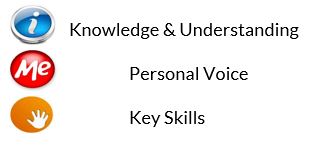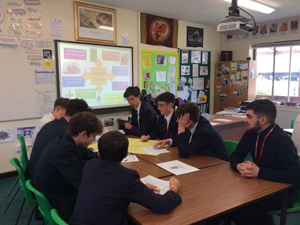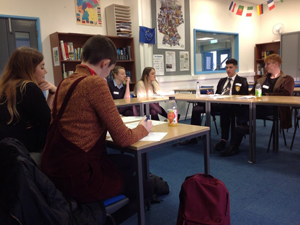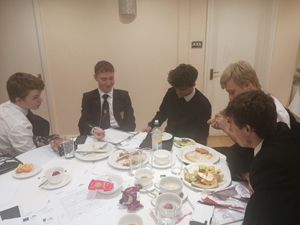Philosophy & Applied Ethics
Head of Department – Mrs S. Godfrey
Tweets by @TBGS_PAE
Our Vision
Philosophy & Applied Ethics is a department at the heart of the TBGS curriculum. It is committed to exploring and challenging a wide range of beliefs and philosophical perspectives and developing meta-cognition and independent thinking skills. Our exciting and ambitious programme of compulsory study, up to and including GCSE, provides an effective springboard for those who wish to pursue the subject in the Sixth Form through our successful A-level and IB courses, and beyond, with many embarking upon philosophy-based degree courses.
It is a strong and flourishing department with a reputation for high achievement and academic challenge balanced with a caring and respectful ethos committed to the development of open-minded, informed and considerate learners.
The department has three core aims:
- To provide a forum in which to examine and appreciate the diversity, significance and impact of religion, belief, philosophical thinking, and cultural perspective on individuals and societies;
- To provide students with the opportunity to develop their capacity for independent thought and ‘phronesis’ (practical wisdom);
- To provide an environment committed to the development of healthy, informed, resilient and balanced learners who are ready to embrace the opportunities, and face the challenges, of a rapidly changing world.
The school’s motto, ‘Dare to be wise’, is the driving force of Philosophy & Applied Ethics here at TBGS. Students follow a carefully constructed programme of study which weaves together key aspects of Philosophy, Religious Education and PSHE whilst developing pupils’ personal learning and thinking skills. It is the department’s aim that all students be equipped with the necessary knowledge-base and skills to think through issues and ideas in an informed, confident and creative way. Key to this approach is the modelling of systematic, critical thinking. Students are viewed as holisitic life-learners and their behaviour is seen to be symptomatic of their thinking. Therefore, the root of their decisions and actions is explored and discussed in a safe and respectful environment.
Students undertake a journey of learning and discovery where they are empowered to become independent thinkers who can make ongoing cross-curricular links and develop their own worldview as well as becoming sensitive to the ideas and opinions of others. A Philosophy & Applied Ethics graduate from TBGS should feel equipped to take on the challenges of living in our modern-day global society and to have an understanding of their own identity on an individual, local, national and international level. It is hoped that they will unlock their potential and develop the strategies and skills to flourish in all areas of their life.
From the start of key stage 3, students are introduced to a ‘toolkit’ of important thinking and learning skills that are continually strengthened and developed through a range of carefully selected ‘big questions’ and themes which facilitate the exploration of important philosophical and religious perspectives and arguments. Students are encouraged to develop their own ideas and to personally engage with a range of viewpoints, critically discussing and evaluating them.
These skills, and much of the key stage 3 curriculum content, are revisited with increasing depth and sophistication as they journey through the key stage 4 Religious Studies programme, which all students follow from the summer term of year 9 until the end of year 11. This purposeful curriculum also provides an effective vehicle, navigated by specialist teachers, through which to effectively deliver many key aspects of the PSHE programme to all year 7-11. From the start of year 7, there is a shared vision of the long-term journey of the Philosophy and Applied Ethics learner which is preparing for formal (and informal) development and implementation of the subject beyond GCSE, setting up the skills and introducing themes that may be explored in greater depth within our A-level and IB courses and indeed in higher level learning beyond. There are in-built opportunities to develop students’ capacity to engage with life beyond the classroom in a confident and informed manner.
Key Stage 3

Our key stage 3 curriculum is taught through a range of big questions and themes as the overview above shows. It is delivered through three 60-minute periods per fortnight
The idea of metacognition is introduced within the first unit of year 7 (making synoptic links to other subjects), and this way of thinking is reinforced throughout key stage 3 and beyond.
Students also become acquainted with what the subject is through practising the correct questions to ask within Philosophy, and considering the three core strands of development at KS3:

These Three Strands of P&AE – and their link to academic progress – are reinforced in each unit throughout KS3. There are explicit lessons devoted to skills (listening/reasoning/questioning) and the ability to develop a justified and informed personal voice is practised within the context of utilising knowledge and understanding and responding to the idea studied; this core approach is reflected all the way to GCSE and beyond. The Three Strands are a form of assessing and developing progress utilised in all KS3 years, so this should become second-nature for students.
In-built to the course are ideas relevant to future study and there are many direct links to our GCSE and sixth-form Philosophy courses.
GCSE Religious Studies
Examination Board: EDUQAS
This course is compulsory for all students. It complies with statutory requirements for Religious Studies and is also a vehicle through which the school delivers many important, statutory components of the PSHE programme.
What will I study?
Component 1 (50%): Religious, Philosophical and Ethical Studies in the Modern World
- Issues of Relationships
- Issues of Life and Death
- Issues of Good and Evil
- Issues of Human Rights
These themes will be studied from through Christian and secular perspectives. Students are encouraged to develop their own arguments and ideas
Component 2 (25%): Christianity – Beliefs, Teachings and Practices
An in-depth study of Christian beliefs, teachings and practices and their local and global impact today.
Component 3 (25%): Islam – Beliefs, Teachings and Practices
This unit begins by challenging Islamophobia and Muslim stereotypes. It goes on to explore important Muslim beliefs, teachings and practices and their impact on Muslims living in Britain today.
How will I be assessed?
The course culminates in three exams: Component 1 (Issues) is two hours long and Components 2 (Christianity) and 3 (Islam) are each one hour long.
How will I be taught?
In three one-hour lessons per fortnight in Year 10 and four one-hour lessons per fortnight in Year 11, we have plenty of discussions and active learning opportunities where we can test out ideas and explore their implications. Our approach helps you to develop the ability to explore and engage with opposing points of view. We ask questions because the answers matter to human beings, and we aim to create a safe, respectful environment to do this.
Why should I study Religious Studies?
Religious Studies provides you with the opportunity to understand more about the world around you: the religious, philosophical and ethical challenges it faces, and your place within it. Following this GCSE course will deepen your understanding of a range of religious and philosophical perspectives and their effect on society. It will develop your competence in a wide range of transferable skills and approaches, and enable you to become religiously, philosophically and ethically informed. It also aims to nurture thoughtful, engaged citizens who place value on exploring and understanding the diverse range of worldviews that exist in today’s society.
The course is valuable for developing thinking skills and learning how to express ideas respectfully, persuasively and articulately.
What have some of our students said about Religious Studies?
- “Studying this subject gives you the foundations you need in order to understand the dynamics of the diverse society we live in. It gives you the knowledge required to form justified opinions free of prejudice.”
- “Religious Studies encourages you to question life, the universe and everything. You learn about different religions and people’s beliefs.”
- “Religious Studies is not only helpful for understanding morality and religion, but for developing skills such as critical thinking and evaluation.”
Sixth Form
What sixth formers have said about the Philosophy A-level and IB courses:
- “By studying philosophy I have been able to hone my ability to debate as well as develop my skills in critical thinking. Philosophy requires you to be prepared to defend your views at a moment’s notice and to be able to think on your feet. The subject is at the heart of asking questions and provides us with the tools to efficiently do this.”
- “Every time I entered the Philosophy classroom it was with complete understanding that I would potentially leave with an entirely different perspective on an issue or life in general. At no point were we allowed to rest easy in our theories.”
A-Level Philosophy
Examination Board: AQA
What will I study?
Philosophy dares us to ask the big questions about life and the world around us. Our course is designed to enable you to directly engage with these fundamental questions and issues. We have plenty of discussions and active learning opportunities where we can test out ideas and explore their implications. We read philosophical texts in order to understand and examine different perspectives on various themes. Our approach helps you to develop the ability to explore and engage with opposing points of view, even when you might think they are incorrect or incoherent. We ask questions because the answers matter to human beings. Although you don’t need to be a philosopher to ask these questions, studying philosophy helps you to give clear, precise, reasoned answers to them. We create a safe, respectful environment to do this.
How will I be assessed?
There are two exams which will be sat at the end of the two-year course:
Paper 1 (50%):
Section 1: Epistemology
- What is knowledge?
- What role do perception and reason play within our acquisition of knowledge?
- What are the limits of knowledge?
Section 2: Moral Philosophy
- Normative ethical theories
- Applied Ethics
- Meat-ethics
Paper 2 (50%):
Section 3: Metaphysics of God
- The concept and nature of ‘God’
- Arguments relating to the existence of God
- Religious language
Section 4: Metaphysics of Mind
- What do we mean by ‘mind’?
- Dualist theories
- Physicalist theories
- Functionalism
There are plenty of opportunities during the course to develop skills of philosophical argument and reasoning, effective written responses and a successful exam technique.
Why should I study this subject?
Studying philosophy helps us to understand the world, to be more rational, to eliminate prejudice and bigotry, and to be clearer about the really big questions in life.
Philosophy doesn’t lead into a single specific career: it leads into a huge range of professions. If you can argue persuasively, clearly articulate your ideas, criticise carefully, and think well, then you are equipped for many different careers. Philosophers go on to work in law, medicine, politics, the media, education, the charity sector, business, management, the arts – to name just a few.
IB Philosophy
What will I study?
Philosophy dares us to ask the big questions about life and the world around us. Our course is designed to enable you to directly engage with these fundamental questions and issues. We have plenty of discussions and active learning opportunities where we can test out ideas and explore their implications. We read philosophical texts (including our prescribed one, Plato’s Republic) in order to understand and examine different perspectives on various themes. Our approach helps you to develop the ability to explore and engage with opposing points of view, even when you might think they are incorrect or incoherent. We ask questions because the answers matter to human beings. Although you don’t need to be a philosopher to ask these questions, studying philosophy helps you to give clear, precise, reasoned answers to them. We create a safe, respectful environment to do this.
How will I be assessed?
Standard Level students work towards two examinations which count for 75% of the final mark:
- Paper One invites you to explore what it means to be human via a picture or short text stimulus. A second essay investigates the philosophical arguments and questions that underpin religion.
- Paper Two will explore ideas and questions raised by our prescribed text, Plato’s Republic. The response will be written as a two-part essay answer.
Higher Level students work towards three examinations which count for 80% of the final mark:
- Papers One and Two are similar to the exams Standard Level students will take with the addition of another essay response linked to Ethics within Paper One.
- Higher Level students also sit an extra paper where they read an unseen text in which the author explores their own understanding of what Philosophy is. Students engage with this by comparing and contrasting it to their own experience of Philosophy. We constantly explore this throughout the course.
Both Standard Level and Higher Level students will produce an Internal Assessment (this is 25% of the final mark for SL students and 20% of the final mark for HL students). This takes the form of a philosophical exploration of a non-philosophical stimulus (this could be an object, song lyrics, excerpt from a movie or TV programme… whatever most interests you).
There are plenty of opportunities during the course to develop effective essay writing style and exam technique. We have a great track record of exam success with our average points score consistently being well above the global average both in Standard and Higher Level.
Why should I study this subject?
Studying philosophy helps us to understand the world, to be more rational, to eliminate prejudice and bigotry, and to be clearer about the really big questions in life.
Philosophy doesn’t lead into a single specific career: it leads into a huge range of professions. If you can argue persuasively, clearly articulate your ideas, criticise carefully, and think well, then you are equipped for many different careers. Philosophers go on to work in law, medicine, politics, the media, education, the charity sector, business, management, the arts – to name just a few.
More Opportunities
There are plenty of opportunities for students throughout the school to extend and enrich their learning and development within this subject:
- Each year the department runs a Year 10 South Devon Philosophy competition;
- Mindfulness and well-being activities are regularly promoted;
- Students are encouraged to participate in external competitions, Philosothons and Olympiads;
- We have close links with Nottingham University and Exeter University. This enables us to invite in guest speakers and to attend conferences;
- Tim Funnell and LiNX Christian Youth Trust regularly support lessons and are involved with enrichment days including the year-7 Buckfast Abbey trip;
We run an annual year-10 panel event, inviting in speakers from Christianity, Islam and the Humanist Society,








